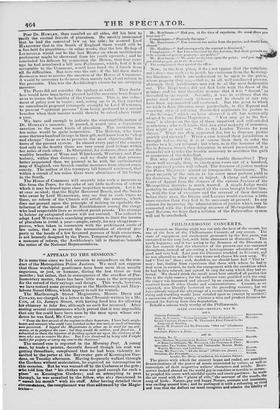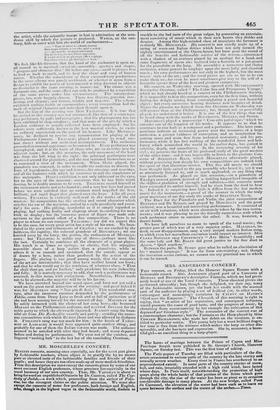PHILHARMONIC CONCERTS.
Tula concert on Monday night was not only the best of the season, but one of the best of the Philharmonic Concerts of any season. The state of enjoyment and excitement generated by the first piece, was sustained to the very last,_with little abatement or diminution. This rarely happens; and it was owing to the firmness of the Directors at the last concert that the character of the present one was sustained throughout, instead of presenting a heterogeneous admixture of very good and very bad. Last year the Directors truckled to IvAsosr, and he was allowed to make his own terms and choose his own song. We had " Vivi tii" then ; and, doubtless, we should have had " Vivi tu" now : but, finding from experience that those with whom he had to deal were in earnest, he took the engagement with the condition which he bad before refused, and agreed to sing the song which they had se- lected. We should think the result must have satisfied all parties that this is the right course ; for the audience were gratified with the song, the singer was honoured and pleased by an encore, and the Directors received from all sides thanks and commendations. Censure, as we expected, was liberally bestowed on the preceding concert; but we have already reaped the advantage of a casual inconvenience. Tempo- rizing and truckling would have entailed upon us (except by accident) a succession of trashy songs ; whereas a wise and prudent firmness has rescued the Society from this degradation. Behold a scheme truly worthy of the Philharmonic. SIXTH CONCERT—MONDAY, MAY 9.
ACT I.
Sinfunia Pastorale
Aria, NI. lessor,. " 0 cars immagine" (Die Zaubtryidte)
Grand Fantasia. Pianoforte, 'FITALBERG, First Pianist to the Emperor of Austria.
Duetto. N. IYANOFF and Mr. Pittman, "Ore sal" (Guillaume Overture, Pietro mra ..4tano
ACT II.
Sinfonia, No. 11
Aria, Madame N1ALIBRAN DE BEKIOT, " Non pia di tiori,"Corno di Bassett° Obligato, Mr. Wit.i.mssr, (La Clemenza di Tito) . Quartette). Two Violins, Viola, and Violoncello, Messrs. MCI WATTS, MOKALT, annul LINDLEY HAYDN. Scena, Mr. Pin " Alt the limn" (Pietro eon Abano).. • Simon. Overture, Der Frieschutz Leader, MY. Moat—Conductor, Sir GEORGE SbIAILT The pieces with which the concert began and ended, are matchless demonstrations of the power of music unassisted by voices, as well as transcripts of their respective writers' characters and minds. BEET- HOVEN looked abroad on the world gay in sunshine or terrible in storms: he peopled his scene with mirthful sports and rustic pastimes: be made the air vocal with the " plaint of rills," the murmur of the woods, the song of birds: Nature, gay and happy Nature, animate and inanimate, was smiling around him ; and he portrayed it with a colouring so vivid and true that the dullest ear must recognize and admire the fidelity of
BEETLIOVk.N. MOZART.
Rosstart. Smog.
HAYDN. MOZART. the artist, while the scientific hearer is lost in admiration at the won- drous skill by which the picture is produced. WEBER, OD the con- trary, bids us enter with him the world of enchantment- - •"rrar di 15•Otil) S i chiusi marmi corpo esti e jar (die spiri e : — al de' nu ranoratili earmi Sin w• la rog E i surd &emu no empi impiega, ear wale srni, e gli diseeglie. c lega:
We feel, like his daemons, that the hand of the enchanter is upon us: all around us is mystical—magical—unearthly: spectres and shapes, " gorgons and chimeras dire," flit before our eyes,—until it pleases Nei to lead us back to earth, and to hear the shout and song of human voices. Whether the coincidence of these extraordinary productions in the same scheme was purely accidental, or whether it arose from a design to exhibit the power of instrumental witiog directed to objects so dissimilar in the mime evening, is immatesial. The choice was a fortunate one, and the same effect can only be produced by a repetition
of the same pieces under like circumstances. The intermediate pieces, too, were happily chosen. There was HAYDN, graceful, inte- resting, and elegant; and Broom, mighty and majestic. The scheme exhibited nothing feeble or commonplace; every composition had the mark of original character and individual thought upon it. But the lion of the evening was Herr Testi:rue. It is true that his arrival in this country was nut aneouneed, like that of a contempo- rary performer, by puffs and paragraphs ; that his physiognomy has not been exhibited in shop-windows ; and that none of the arts by which a London audience is usually collected have been employed : but his talents were sufficiently known in the best musical circles, to excite no ordinary expectation on the part of his hearers. Like MENDELS- SOHN, he declined to receive any remuneration for playing at the Philharmonic Concert. 'Ina SEEM: played (contrary to usual cus- tom there) without any orchestral accompaniment. The orchestra presented an unusual appearance as he entered it. Every performer was unemployed, and it is the habit of those who are so to retire into the adjacent room : but, on this occasion, the only movement of the band was from the left wing to the right : the principal performers were clustered around tile pianoforte, and the rest stationed themselves so as to command a view of the instrument. When HERZ played, the pianoforte was removed, in order to enable the audience to discern his feats of legerdemain—his ups and downs—his crossings and weavings, and all the fooleries with which he contrives to gull the simpletons of this metropolis. HERZ'S exhibition is not only addressed to the eyes, but to the eyes of the ignorant : conscious that he has little worth hearing, he is doubly anxious to be seen. 'fulminate seated himself at the instrument where Mid as he found it ; and u very few bars had passed before we were satisfied that no common mind impelled the firm, brilliant, and rapid finger that glanced over the keys. Like all great writers, THALBERG is evidently well-read in the works of the old masters: his composition has the sterling and sound character which satisfies the ear of the musician, united to a style peculiarly and essen- tially his own. His playing, wonderful as it is simply regarded as playing, had nothing frothy and claptrap about it—nothing for mere trick or display ; but the immense power of finger was made sub- servient to the general effect of a fine composition. There is no player to whom we can compare THALBERG : nor did we expect this to be the case, for every great artist has a style of his own. We luxu- riated in the grace and refinements of CRAMER ; we are excited by the boldness, the rapidity, the colossal grandeur of Moscneses ; we are hurried away by the fancy, the genius, the enthusiasm of MENDELS- SOHN : but THALBERG is unlike any of these—perhaps most like the last. Certainly he combines all the elements of a great player. His touch is at times so springy, so elastic, that his arpeggios resemble those of a harp rather than a pianoforte, while at others it is so smooth and sustained, that the sounds appear as if drawn by a bow, rather than produced by the action of the fingers. His playing is one proof among many, that the resources of the art are interminable ; that they have neither bound nor limit ; and that he who would say to the musician, of whatever class, " Thus far shalt thou go, and no further," only proclaims his own ;imbecility and folly. It is scarcely necessary to add, that such a performance was
received, in this room, with enthusiasm. Nevertheless, Heitz needs not to be alarmed—the majority will be in his favour.
We have stretched beyond our usual space, and have not yet said a word on the great vocal attraction of the evening : and great indeed it was, for IIIALIERAN sung " Non Oh di fiori." This wonderful crea- ture, after the immense exertion demanded by the performance of Fidelio, came from Drury Lane as fresh and as full of animation as if she had been nursing herself for the concert all day. Mmasake may be safely intrusted with the choice of her song here—she bestowed MOZART on the Philharmonic audience, and reserved BELLINI for the noble party to which she afterwards eeparted. IVANOFF sung the beau- tiful air from Die Zanberfliite sweetly and purely ; avoiding the nause- ous coxcombries with which RUBIN' chose and was allowed to disfigure it. PHILLIPS'S song was too much for him : in the hands of TAMDC- Rtm or LABLACHE it would have appeared quite another thing; and probably for one of them the Italian version was made. The audience seemed to be satisfied with what they had heard; and many departed before and during its performance. We were not of the number, and lingered "nothing loth" to the last bar of the concluding Overture.



























 Previous page
Previous page